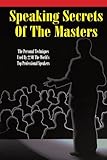Toastmasters is highly effective because most everyone there wants to help you improve your public speaking skills. It is an environment for learning and failing without consequences. You can't learn public speaking without an audience, and the Toastmasters club audience is probably the best audience for newbies starting out (e.g. the experienced speakers there emphathise and help you because they were in your position months or years ago)
If anything, you will learn to stop using fillers (umming/ahhing). Pauses ... can be so much more effective). Why? Because someone at each meeting sits there and counts everyone's verbal fidgeting. What can't be measured, can't be improved. Add in public shame and that goes a long, long way. To this day, I am shocked at people two/three levels above me who obviously never worked on their verbal or even non-verbal tics. If you practice, Toastmasters builds unconscious competence in eliminating certain things that may distract the audience (umming, arm swinging, clapsed hands).
The best part of Toastmasters is called Table Topics - where you have to give an impromptu answer to a question. 1-2 minutes. Like some public speaking opportunities are, off the cuff and unrehearsed.
After every speech you give, members will write encouraging comments and feeback on little slips of paper. I still have those little slips of paper in an album somewhere. They still make me feel good. Our club had a video camera - I had all my speeches videotaped. Wow, the camera does not lie - my posture sucked and I rocked my arms [all distractions from your speaking]. And, it is clearly visible to see the progress you make from speech #1 (your icebreaker) to #10.
I highly recommend finding a club that you like (not all clubs are alike) - especially one where no one from your workplace will be (a freer environment to learn public speaking).
I dove into the Toastmasters program. I put a lot into it (VP Membership, mentoring, contests) and got a lot from it. Lastly, I've made some friends (mostly entrepreneurial) through TM that I would not likely have encountered in my normal life. TM brings together some pro-active individuals.
Book recommendation (the best book I've found on public speaking - great because it has so many different viewpoints/perspectives) : http://www.amazon.com/Speaking-Secrets-Masters-Techniques-Pr...

It's an excellent environment to learn. You are usually not with people you work with (unless you go to a club that is inside your company - which I would not recommend). Not being with people who are your co-workers - gives you the freedom to screw up.[1]
For a book on public speaking, I highly recommend this one:
http://www.amazon.com/Speaking-Secrets-Masters-Techniques-Pr...
Because it has a lot of different perspectives and views on how to do it.
If you go up to the mike at a public meeting and ask a question or state an opinion, that is public speaking. Try it, it's kinda scary but you might get addicted to it.
For conversation, the best technique I've learned to start a conversation - don't start with a question - that puts the person on the spot right away (for example - 'What do you like about this painting?' - what if they don't like the painting?, 'What books are you reading?' - what if they don't read books?). If you ask a question, you are asking someone to contribute right away - you need to start the conversation - you did approach him or her right? Instead, start with a context-sensitive statement ('I like the brushstrokes in the painting. It makes me feel like I'm watching an action movie.' - 'I don't read enough books. I feel like I need to find a new genre to read').
Also, for conversation, avoid the "God perspective". A lot of people make this mistake in conversation. See, I just intentionally used the "God perspective". Let me try again - "I feel that a lot of people try to come across as experts - especially when meeting new people - 'This restaurant is the best' and sometimes I think it backfires and just makes them seem insecure, seeking approval'.
Practice hearing people talk about feelings. From guys talking about their favorite team to women talking about shopping, there is always an undercurrent. The secret to relating to someone, to getting along with someone is to acknowledge how they feel and tell them how you feel.
[1] Also http://rejectiontherapy.com